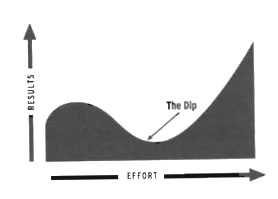Observing Builders
If you really want to understand builders and what makes them survive, tick and thrive; observe what they do.
During my professional life, this is one thing I've spent hours doing whether it is observing a young and budding engineer I might have hired for the organization I work for or observing the famous online-success-stories through their blogs and through what they ship.
Grabbing my attention is easy. All you have to do is mention a genuine builder and if I can observe him personally, through his work or through his blog; I will.

As it turns out, builders come in all shapes and sizes. They have different ways of working. Some of them prefer to lie low and ship while others thrive by selling the achievements of their team to their organizations. Some prefer talking to the compiler and shipping amazing stuff, while others weave remarkable stories and make small dents in the universe with their very own unique perspectives.
After working with multiple genuine builders and observing countless others online, if there is one conclusion that I've arrived at, it is that each builder is different from another. Yet the fundamentals that make these individuals builders generally the same.
One of my objectives of writing this book was to turn this personal observing exercise into a coherent stream of thoughts that allow me to not just observe builders; but actually dissect their actions and arrive at my very own conclusions regarding the people who build organizations, teams or bring amazing products and services into our life.
What follows are common traits I've seen in every single genuine builder I've observed or worked with in my life.
Consistency.
It's not that whiners don't have amazing ideas or cannot do great stuff. It's easy to write off whiners as people who whine, bitch and waste everyone's time but that is clearly not the case. Some of the whiners that I've observed are fairly intelligent and smart people; yet they are unable to deliver anything that makes any considerable impact on the organization, the team or the project that they work on.
So, what is going on with the whiners?
Why can't whiners get to ship something that has any impact on anything or anyone's life?
The answer to this question lay in my interactions with Fred and Jane.
I met Fred and Jane back the days when I was working at Multiplitaxion Inc.
Fred like most whiners, was big time into bitching, moaning and Resume Driven Development.
After a few days of observing Fred, I realized that Fred was not a bad guy after all.
Slightly political --- definitely.
Naughty --- sure.
Stupid --- not really.
Fred often did have his share of amazing ideas which were genuinely all right.
Fred however, had a problem.
You couldn't get Fred to work on a single project for more than a couple of months. Fred was a classic parasite, that overwhelmed the project team with the list of cutting-edge technologies they aught to use and when he had made it amply clear to people sitting high up in the pecking order of the organization that he had contributed sufficiently by providing 'thought leadership' or by doing a dozen 'proof of concepts' he would jump over to another project.
Fred was what I called the 'Idea monkey' back then.
You could allocate Fred to the most comfortable of all the projects and be rest assured things would start going wrong. You would start having communication issues, issues with timelines and issues with shipping.
Jane on the other hand, happened to be a quite builder who was slightly reserved and liked doing her work quietly in a corner cubical. You hardly ever saw her laughing or hanging out with people; not even with her own team. She was a quite, intellectual who liked to be alone and write code.
There was something strange about Jane though.
If you had a project that was stumbling or failing all you had to do was to put Jane in the project and then slowly things would start falling in the right place.
It wouldn't happen overnight though.
It would take weeks, sometimes even a few months before a late project would come back on time or a project littered with bugs and broken windows would suddenly start meeting the quality standards.
By that time Jane would have developed really strong hold on the project and would have settled down with one track focus of shipping, sprint after sprint. Ask her if she wanted to move to a different project and she would look at you with eyes which would made you feel sorry you asked.
Here is the spooky part however --- if you were to compare the years of experience, educational qualifications, designation or even genuine technical competence and talent of Fred and Jane, Fred would beat Jane hands down. Yet, Fred, somehow managed to screw up project after project when Jane led even the most screwed up ones to a successful end.
What was happening here?
It took me a couple of months to figure this one out. On the surface Both of these talented individuals were awesome guys and equally fun to interact with.
On close observation for a couple of months however, you would notice that there was one thing that separated the two however. While Fred, was seriously interested in 'proving' his abilities and chasing one successful project after another; Jane was interested in getting into a project, understanding the issues, developing firm roots on the project and then working on solving one problem after another --- consistently.
Project after project, If there is one thing I've learnt, it is that consistency is one quality which differentiates genuine builders from whiners. Not talent, competency, caliber or anything else. Irrespective how much much talent, intelligence, competence, smartness or IQ you have if you are not consistent, chances are that you either are a whiner or will turn into one pretty soon.
Seth Godin for example, differentiates performers from ones who forever remain the realms of mediocrity using the concept of Dip. He uses the following diagram to illustrate Dip:

Seth explains:
Almost everything in Life worth doing is controlled by the Dip, At the beginning, when you first start something, it's fun. You could be taking up golf or acupuncture or piloting a plane or doing chemistry-doesn't matter; it's interesting, and you get plenty of good feedback from the people around you. Over the next few days and weeks, the rapid learning you experience keeps you going. Whatever your new thing is, it's easy to stay engaged in it. And then the Dip happens. The Dip is the long slog between starting and mastery. A long slog that's actually a shortcut, because it gets you where you want to go faster than any other path. The Dip is the combination of bureaucracy and busywork you must deal with in order to get certified in scuba diving. The Dip is the difference between the easy "beginner" technique and the mare useful "ex-pert" approach in skiing or fashion design. The Dip is the long stretch between beginner's luck and real accomplishment. The Dip is the set of artificial screens set up to keep people like you out. |
The Dip, according to Seth is the point where excitement of doing something new dies down. If you are a blogger, Dip is the point where you realize that no-one cares about your blog and that your blog with three entries about your cat will not make you the most popular blogger on planet earth. If you are a software developer writing an open source application, Dip is the point where you realize that you are just not getting more than ten downloads a month.
If you are a young and budding entrepreneur trying to build a business around an idea which you once thought will change the world, Dip is the point when just ten unique visitors show up on your website on the launch day and no-one is willing to buy your universe changing product for just ten dollars.
Long story short, Dip is the point where the excitement of starting something new dies down and the realization that you are not going to change the world with whatever it is that you are doing, as easily as you had expected you would, sets in.
That's when most whiners jump on to something else.
That's when a whining blogger starts a new blog; a whining entrepreneur thinks of a new idea; and a whining programmer hops over to a new project or a new job. Genuine builders however, ask themselves if they genuinely love and believe what they are doing.
They ask themselves if they can spend rest of their life doing it.
If the answer is no, they surrender shamelessly and then then learn to work hard to avoid things they do not genuinely enjoy doing.
if the answer is yes, however; they continue working at what-ever-it-is-that-they-were-working-on.
Consistently.
The same ruthless consistency holds true even with genuine story teller Elizabeth Gilbert. In her PowerPoint-less-presentation about the 'Genius' at TED, which is one of my favorite talks ever, she talks about her life as an author, the reason behind her success and how she continues to overcome her fears:
If we think about it this way it starts to change everything. You know, this is how I've started to think and this is certainly how I've been thinking about in the last few months, as I have been working on the book that will soon be published as the dangerously, frightenly, over anticipated follow up to my freakish success and what I have to sort-of keep telling myself when I get really psyched out about that is "don't be afraid", "don't be daunted", just do your job. Continue to show up for your piece of it; whatever that might be. If your job is to dance, do your dance. If the divine cockied genius assigned to your case decides to let some sort of wonderment be glimpsed for just one moment through your effort, then Ole! And If not, do your dance anyhow and ole to you none the less. I believe this and I feel that we must teach it. Ole to you none the less just for having the sheer human love and stubbornness to keep showing up. |
Jeff Atwood from coding-horror is no different. He describes the success behind his amazing blog and gives sound advice on how to ahieve ultimate blog success in one easy step:
When people ask me for advice on blogging, I always respond with yet another form of the same advice: pick a schedule you can live with, and stick to it. Until you do that, none of the other advice I could give you will matter. I don't care if you suck at writing. I don't care if nobody reads your blog. I don't care if you have nothing interesting to say. If you can demonstrate a willingness to write, and a desire to keep continually improving your writing, you will eventually be successful. But success takes time --- a lot of time. I'd say a year at minimum. That's the element that weeds out so many impatient people. I wrote this blog for a year in utter obscurity, but I kept at it because I enjoyed it. I made a commitment to myself, under the banner of personal development, and I planned to meet that goal. My schedule was six posts per week, and I kept jabbing, kept shipping, kept firing. Not every post was that great, but I invested a reasonable effort in each one. Every time I wrote, I got a little better at writing. Every time I wrote, I learned a little more about the topic, how to research topics effectively, where the best sources of information were. Every time I wrote, I was slightly more plugged in to the rich software development community all around me. Every time I wrote, I'd get a morsel of feedback or comments that I kept rolling up into future posts. Every time I wrote, I tried to write something just the tiniest bit better than I did last time. |
If there is one thing that connects every single genuine builder that I have studied, observed, looked up to, seen or worked with, it is relentless consistency to keep showing up.
Your girl-friend dumped you?
Feeling low?
Having problems at work?
Guess what --- no-body cares.
Unless of-course you have a something remarkable in it for them which makes them care.
To add to that, neither of these are reason enough not to ship on your own self picked schedule.
If you haven't picked one thing that you absolutely love doing, and are not giving it your consistent focused attention day-after-day relentlessly; for years; you probably are just wasting your time, whining away to glory.
If you are going to stop reading this book, right now, right here, remember this before you do - builders ship; consistently.
Oh and that product that your organization might be shipping out successfully --- it is *not* shipping because your young and budding managers who are awesome at organizing meetings and talking big are going on a white-board or brainstorming about cutting-edge ideas.
Chances are, that it is shipping because, a few builders in your organization, who you may not even know have been slogging away, quietly; for years; without looking for a new opportunity, a new project to jump on to or something new and exiting to hop on to. It's shipping because of tremendous amount of commitment, hard work and the will to 'show up' day-after-day which is often characteristic of genuine builders.
That's consistency.
Of all the traits of genuine builders, this is one that all genuine builders I have seen so far; demonstrate; consistently.









Comments are closed.